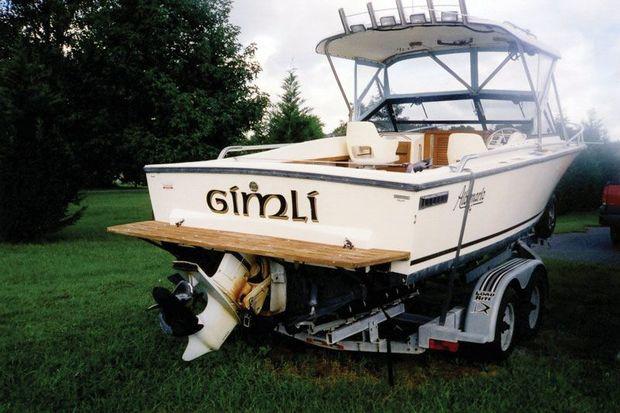New boats have many advantages—including getting everything you want in one package, having an extended warranty, and that new fiberglass smell. But they also cost more than something similar in a used boat. If you do your due diligence and spend some time checking out your purchase of a pre-owned boat, you can come pretty close to having everything you want while saving a considerable amount of money.

New Boat Dealer
The best place to buy a used boat is from a new boat dealer, where you’ll find a wide selection of boats in all sizes and price ranges to choose from. Some of these boats will be trade-ins, and others will be brokerage boats. The difference is that trade-in boats belong to the dealer, while brokerage boats belong to an owner who has placed the boat with the dealer and will pay him a percentage of the sale price when the boat is eventually sold.
The boats that the dealer owns should have gone through an inspection by the service department, and any problems will have been repaired. It is also possible the dealer may give the buyer a short warranty. Brokerage boats may not get service and seldom if ever come with any type of warranty.
Any boat you buy must be thoroughly checked out, either by yourself or a surveyor. This must always include a test drive.
A professional surveyor will cost money, but will provide a complete report on the condition of the boat. He or she will inspect the boat from stem to stern and look into things you probably would not think of. I highly recommend using a surveyor when purchasing any boat over 20 feet. Once you have the report in hand, you can go back to the seller and ask for any problems to be resolved or for a significant price reduction. The money you save may be more than the price of the survey.
Private Seller
Purchasing a boat from a private person comes with considerable risk. The boat could have serious problems that the seller may or may not be aware of. In either case, unless you uncover the problem, it will be your problem after the sale. This is where a surveyor really becomes important.
Just one word of warning: there have been scams where someone advertises a boat or car for sale, and when the buyer shows up to see the boat, he or she is robbed. Be careful about where the seller wants to meet, and use good judgement. If it sounds fishy, it probably is.
When you go to inspect the boat, observe the owner’s home and grounds. If they look good, chances are the boat has been well maintained. If not, just walk away.
Always ask for service records. No records? Then just walk away.
Even if you plan to hire a surveyor, inspect the boat yourself. You could uncover things that will negate the sale before you have to pay someone else to point it out to you. These might include corrosion at the wiring bus or battery terminals, a rusty oil pan on an I/O engine, cracked belts, lots of oil in the bilge, worn curtains, yellow or cracked Plexiglas, spider cracks in the fiberglass, or any one of a million and one other problems.
Then, there is the price. All boat owners believe their craft is worth much more than it actually is. Do some research to find out the average selling price, not the asking price. Make a reasonable offer, and then be prepared to haggle a bit.
The biggest mistake I see buyers making is wanting a boat so badly that they pay too much, or try to ignore warning signs. I have been there, too, and had to slap myself in the face to regain my sanity. When the list of things you can fix once you get the boat exceeds one, it is time to walk away. The way I look at buying a used boat is ‘I don’t have it now so if I don’t get it, I won’t be any worse off. If I do make the purchase, I just might be a lot worse off.’
I bought my first used boat in the late 1960s, and I have purchased several more since then. So far I have nothing to complain about, as all of my boats served me well. I wish you the same success with your used boat buy.
Start looking for your new used boat at
proptalk.com/proptalk-broker-ads.


